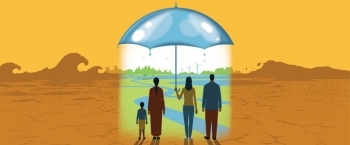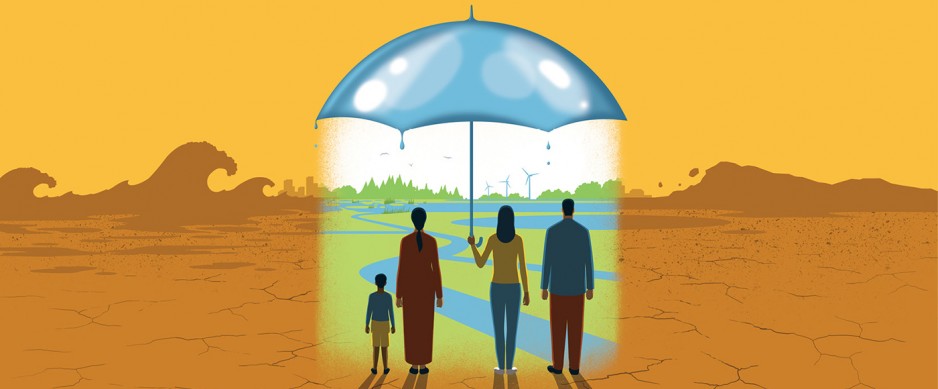
.png) Dr. Pauly Mathew Muricken
Dr. Pauly Mathew Muricken

World Water Day, held on 22 March every year since 1993, celebrates the glory and worth of water and raises awareness on the 2.2 billion people living across the globe being deprived of basic access to safe and readily available water. This is an occasion that speaks about the need for taking action to tackle the global water crisis. A core focus of World Water Day should therefore be to support the accomplishment of Sustainable Development Goal No.6, namely, water and sanitization for all by 2030.
Making the invisible visible
Groundwater is an invisible resource with an impact visible everywhere. It is water found underground in aquifers, which are geological formations of rocks, sands and gravels that hold substantial quantities of water. Groundwater feeds springs, rivers, lakes and wetlands, and seeps into oceans. It is recharged mainly from rain and snowfall infiltrating the ground. It can be extracted to the surface by pumps and wells.
Life in short means living well. It would not be possible without groundwater. Most arid areas of the world depend entirely on groundwater. It supplies a large proportion of the water we use for drinking, sanitation, food production and industrial processes. It is also critically important to the healthy functioning of ecosystems, such as wetlands and rivers. Hence there is an emerging need to protect groundwater from over-exploitation caused by abstracting more water than is recharged by rain and snow. There is equally a need to protect groundwater from pollution that currently haunts them, failing which it can lead to its depletion.
The landmark judgment of the US Supreme Court in County of Maui, Hawaii v. Hawaii Wildlife Fund (2020) holding that Clean Water Act also regulates groundwater and hence permit is required when there is a direct discharge from a point source into navigable waters has given a new dimension in abating the menace of groundwater discharges. This is in tune with the environmental principle that exploring, protecting and sustainably using groundwater is central to survival and adapting to climate change and meeting the needs of a growing population.
The elixir of life
Water is the elixir of life. We need to conserve it. Access to good quality water and sanitation are recognized by United Nations as human rights, reflecting the fundamental nature of these basic necessities in every one’s life and livelihood. Lack of access to safe, sufficient and affordable water, sanitation and hygiene facilities has a devastating effect on the health, dignity and prosperity of people, and has significant consequences for the realization of other human rights.
The right to water entitles everyone to have access to sufficient, safe, acceptable, physically accessible and affordable water for personal and domestic use. The right to sanitation entitles everyone to have physical and affordable access to sanitation, in all spheres of life, that is safe, hygienic, secure, socially and culturally acceptable and that provides privacy and ensures dignity.
Rights-holders and Duty-bearers
People are rights-holders and States are duty-bearers of providing water and sanitation services. Rights-holders can claim their rights and duty-bearers must guarantee the rights to water and sanitation equally and without discrimination. The United Nations General Assembly, through Resolution 64/292 dated 28 July 2010, explicitly calls upon States and International Organizations to provide financial resources, help capacity-building and technology transfer to help countries, in particular developing countries, to provide safe, clean, accessible and affordable water and sanitation for all.
It is estimated that 2000 children die every day solely because they do not have access to clean and safe water. Commenting on the primary and positive role of States in this arena, Ban Ki-moon, the former Secretary General of United Nations states: “The children who have no clean water to drink, the women who fear for their safety, the young people who have no chance to receive a decent education have a right to better, and we have a responsibility to do better. All people have the right to safe drinking water, sanitation, shelter and basic services”.
Implied Fundamental Right
In India, the right to water has been protected as a fundamental right by the Supreme Court by reading it as part of the broad rubric of the right to life guaranteed by Article 21 of the Constitution of India. Connotations of life have been expanded significantly over the last three decades to include the right to health and the right to clean environment which undisputedly include the right to clean drinking water.
Protection of rights also means positive protection. Hence right to water can be extended not only to mean that people should not be denied access to water but also that in areas where no access to drinking water is provided by the State, the constitutional right to life guarantee would impose a duty on the State to positively provide water.
Article 39(b) of the Directive Principles of State Policy (DPSP) recognizes the principle of equal access to the material resources of the community and ensures its equitable distribution to subserve the common good. In Narmada Bachao Andolan (2000) Supreme Court held: “Water is the basic need for the survival of human beings and is part of the right to life and human rights as enshrined in Article 21 of the Constitution of India …and the right to healthy environment and to sustainable development are human rights implicit in the right to life”.
Then again in Peoples Union for Civil Liberties (2001), the Supreme Court studiously observed presumably drawing inspiration from the anti-poor jurisprudence: “Plenty of food is available, but distribution of the same amongst the very poor and the destitute is scarce and non-existent leading to mal-nourishment, starvation and other related problems”.
Right to adequate food and water should be part of Bill of Rights, as in the case of South African constitutional jurisprudence, which treats it as an explicit constitutional right. This right cannot be allowed to float in between the theories of economic capacity and State resources. As declared in the UN Resolution passed during the UN Water Conference in 1977, “All people, whatever their stage of development and their social and economic conditions, have the right to have access to drinking water in quantum and of a quality equal to their basic needs”.
In the pursuit of Happiness
The right of access to water is implied by the protections of life, liberty and pursuit of happiness. Without clean water, there is a real risk to “life”, and there can hardly be a “pursuit of happiness”. The right to water is therefore at the core of protections guaranteed by the government.
We cannot, on the one hand, declare that everyone has the right to life, liberty and the pursuit of happiness and, on the other hand, deny people the right to water. In United States, California has become the first State to recognize explicitly the human right to water in 2012. Other States are yet to move in that direction expressly guaranteeing every person’s right to water.
Thomas Jefferson’s words in the American Declaration of Independence is suiting the context: “We hold these truths to be self-evident, that all men are created equal, that they are endowed by their Creator with certain Unalienable Rights, that amongst these are Life, Liberty and the pursuit of Happiness”.
Water is life. Clean water means health. Access to safe water is a fundamental human need and a basic human right. Ending poverty begins with clean water. The worth of water was explained by John F. Kennedy when he said: “Anyone who can solve the problems of water will be worthy of two Nobel Prizes -- one for peace and one for science”.
If water is a right, then State is responsible for fulfillment of that right. Such a bold stand is necessary for addressing one of the most fundamental failures of 21st century development. “We the People” have a role here and we must do more to ensure that discrimination is eliminated regarding access to water and sanitation.
(The writer is a prominent Lawyer, an acclaimed writer and a distinguished academician based in Kochi)